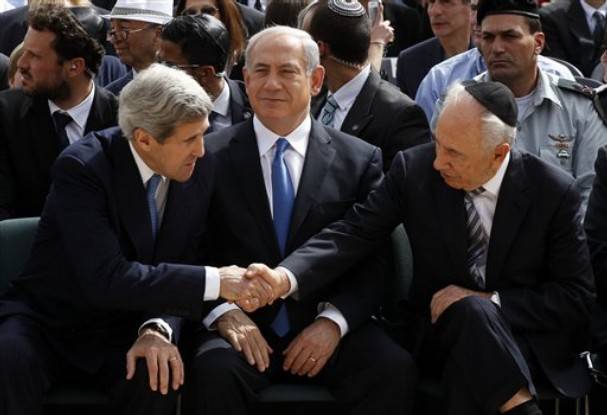Israel has called off a planned release of Palestinian prisoners meant to advance the US-sponsored peace process and called for a review of how the troubled negotiations can make progress, an official briefed on the talks said on Thursday.
The official, who declined to be identified, said Israeli negotiators had informed their Palestinian counterparts of the decision in a Wednesday night meeting held at Washington's behest in an effort to avert a collapse of the talks.
The crisis surfaced at the weekend when Israel refused to release a group of Palestinian prisoners under the terms of a previous accord unless it received assurances the Palestinian leadership would continue with negotiations beyond an initial end-April deadline set by U.S. Secretary of State John Kerry.
Kerry flew to Jerusalem on Monday and was trying to put the talks back on track. But his mission was jeopardized when Palestinians signed 15 international conventions, mainly through the United Nations, that could give them greater leverage against Israel.
"As the agreements on the release of prisoners were subject to upholding the Palestinian commitment not to go to the U.N., new conditions have been created and Israel will not be able to free the prisoners," Israeli negotiator Tzipi Livni told the Palestinians, according to the official briefed on the talks.
The official further quoted Livni as saying: "The sides should now review how it is possible to make progress in the negotiations." She urged the Palestinians to withdraw from the new conventions they had signed. A top Palestinian official said they would not backtrack from their decision to join international conventions and were now within their rights to join all UN agencies.
"Our response must be to join all the international institutions until we reach the International Criminal Court," prisoners affairs minister Issa Qaraqe said.
Joining the court could eventually allow Palestinians to lodge formal legal cases against Israel, and is seen by the United States and Israel as the most dangerous step they could take. Signing the conventions was "the correct response to the Israeli game of not releasing the fourth group of prisoners on time...Israel is the one who began this and took the unilateral decision. Today, it announced its decision formally," Qaraqe said.
The United States has criticized "unhelpful, unilateral actions" by both sides and Kerry sought on Thursday to cast the crisis in a more hopeful light, telling reporters while visiting Algeria that the Israeli-Palestinian dialogue "remains open".
During the negotiators' meeting "there was progress made in narrowing some of the questions that have arisen as a result of the last few days but there is still a gap and that gap will have to be closed and closed fairly soon," Kerry said.
In Washington, State Department spokeswoman Marie Harf said that US officials "haven't been informed of any such decision" by the Israelis to call off the planned release. Harf declined to explain the nature of the progress that Kerry cited and acknowledged that the talks were at "a very critical point."
Aimed at creating a Palestinian state and ending a decades-long conflict, the negotiations have also stalled over Palestinian opposition to Israel's demand that it be recognized as a Jewish state, and the issue of Israeli settlements in the occupied West Bank and East Jerusalem. Kerry has repeatedly visited the region since reviving the talks last July in a bid to avoid deadlocks that have plagued past diplomacy. He put the onus of success on the feuding sides.
"It is really their decision, and it has to be made. They understand what the choices are, they understand what the stakes are, and they understand each of them their own limits and dynamics," he said.
Israeli officials in Jerusalem said there was still a small chance that an agreement might be reached to extend the talks. They said the next 72 hours would be critical. Palestinians want an independent state in Gaza, the West Bank and East Jerusalem - lands captured by Israel in a 1967 war. While all parties say negotiations are the best path to peace, Palestinians say they may eventually resort to international bodies to force Israel to make concessions.
The UN General Assembly voted to recognize Palestine as a non-member state in 2012, entitling it to join the conventions that Abbas signed on Tuesday. These include agreements against discrimination against women and for the rights of disabled people, as well as the Geneva Conventions.
US support is key to Abbas's administration in the Israeli-occupied West Bank. Around $500 million in annual aid to the Palestinian Authority helps keep its public sector and security forces afloat. The other Palestinian territory, Gaza, is governed by Abbas's Islamist Hamas rivals, who spurn Palestinian coexistence with Israel.
Palestinian Foreign Minister Riad al-Malki on Wednesday played down the prospect of U.S. sanctions in response to Abbas's signing of the 15 international conventions, as they dealt with social and human rights rather than the quest for full membership in UN bodies.






